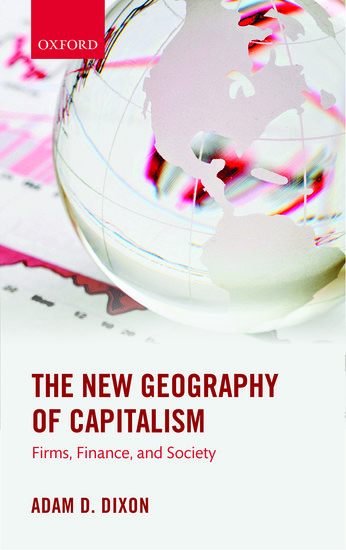Reviewing a range of debates and theories across the contemporary social sciences – varieties of capitalism, financialization, global production networks – this book aims to show how the insights of economic geography can be usefully brought to bear in understanding current trends, and the changing relationships between global financial markets, multinational firms, and contemporary welfare states. Muireann O’Dwyer believes that this will be read with approval by many in Economic Geography, but it would be a true shame if those in other disciplines did not also pay close attention.
 The New Geography of Capitalism: Firms, Finance, and Society. Adam D. Dixon. Oxford University Press. 2014.
The New Geography of Capitalism: Firms, Finance, and Society. Adam D. Dixon. Oxford University Press. 2014.
These days, there is no shortage of books that set out to offer an explanation of the global economic system. Many seek to explain the steps that led to the collapse of 2008; others look forward, trying to analyse where we should go from here, focusing on ways of avoiding a similar catastrophe. Even those books which do not take the crisis as their starting point can simply not help but be influenced by it. Adam Dixon, a Senior Lecturer in Economic Geography at the University of Bristol, has written a book that seeks to explain, as the title says, The New Geography of Capitalism. It is in parts an introduction to, and defence of, the approach of Economic Geography, while in others it is a case study in the financialisation of society.
This book is an intervention in one of the key debates of global economics: is globalisation leading to a great convergence of national economies, or will the many “Varieties of Capitalism” remain diverse? By focusing on finance, in particular, Dixon aims to engage in a cross-disciplinary dialogue, bringing the perspective of Economic Geography into conversation with that of Political Economy. Within Political Economy, the literature on Varieties of Capitalism is booming. The basic argument of this approach is that despite the pressures of globalisation, the structures of national economies remain, and will continue to be, diverse. As they began from different starting points, either as liberal market economies, such as the United States or the United Kingdom, or as co-ordinated market economies, such as Austria or Sweden, different national economies respond to the forces of globalisation differently, and their adaptation does not lead to convergence, but to a variety of institutional structures. Dixon is writing from within the field of Economic Geography, and argues instead that what we are witnessing is “Variegation within Capitalism” – that is, an understanding of capitalism as a diverse, but singular, global phenomena, with an inherent and coherent logic.
Dixon’s argument begins with a chapter outlining the great interconnections of global production. While he doesn’t go so far as to claim that globalisation has created one large-scale system of manufacturing, he does point out that there are global chains of connectivity that make isolationist views of manufacturing or production untenable. These connections range from globalised supply chains and finance provision to the convergence of standards in areas such as health and safety. He argues that these relationships across national borders do lead to convergence, as both competition and collaborative learning incentivise a sharing of practices. It is unclear, however, how much of this is occurring on a truly global level. While the logic presented in this chapter is certainly observable within regions such as the EU, such regional development may in fact signal the enforcement of diversity, protected by regional trade deals, rather than a global convergence overseen by institutions such as the WTO.
A key empirical contribution of the book is to be found in its examination of the financialisation of key aspects of the state. Across two chapters, Dixon explores the changing nature of the welfare state, and the shift in pensions policy across much of the western world. In both cases, the book charts how states have responded to similar pressures of demographic change, economic instability and the demands of democratic politics. Provision of services associated with the welfare state has become increasingly embedded within the world of finance. For example, pensions are no longer supplied solely by contributions from the current working cohort, but rather they rely upon pension funds that engage in investment in order to secure returns to fund pension payments. By becoming embedded in the world of finance, Dixon argues, pension funds become increasingly similar globally, as they compete for the best returns on investment.
The underlying argument of The New Geography of Capitalism is that economies worldwide are converging in function, if not in form. By this, Dixon is arguing that, even if there remains diversity in the visible structure of economies, they are all moving to provide the same services to firms, individuals and society in general. In prioritising analysis of function over that of form, many of the binaries which underpin the Varieties of Capitalism literature can be destabilised. For example, Dixon argues that the division between economies characterised by a reliance on bank finance and those that rely on market finance holds a limited analytical use. Since both banks and markets now perform similar functions of distribution of capital, protection of investors (or savers) and oversight of borrowers, the distinction in form should not hide the increasing uniformity in function. This argument is deployed in a similar way against other binary categorisations as well, such as of public and private banking, but the book is primarily about finance, rather than capitalism as a whole. As such, it remains unclear to what extent the prioritisation of function over form would undermine the analysis of Varieties of Capitalism. It would not, for example, do much to advance understanding of the diversity in education and training programmes across different states.
This book is well written, and while it is innovative, it is also quite readable. Dixon goes to great effort to make his argument intelligible across disciplines, and even to a non-academic audience. This is part of the effort to begin a cross-disciplinary debate – something that should definitely be applauded. While the book is somewhat limited by focusing specifically on finance, as well as a reliance on a simplified version of the Varieties of Capitalism approach against which to argue, both of these seem to be fair trade-offs which allow the book to instigate broader discussions. It will be read with approval by many in Economic Geography, but it would be a true shame if those in other disciplines did not also pay close attention to this book.
Muireann O’Dwyer is a Government of Ireland Scholar and PhD candidate, based in the School of Politics and International Relations in University College Dublin. She is in the PhD in European Law and Governance programme, which is involves engagement with the School of Law as well as with the school of Politics and International Relations. Her work focuses on building a feminist evaluation of new forms of EU governance, and aims to be intensively interdisciplinary. She holds degrees from NUI Galway (BA), UCL (MSc) and UCD (MEconSc). She tweets @mergito. Read more reviews by Muireann.







